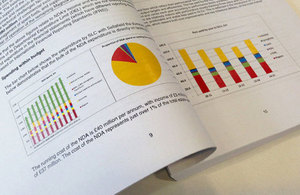Annual report and accounts 2014 to 2015
Significant progress on hazard reduction, particularly at Sellafield, was among the highlights of the last financial year outlined in our Annual Report and Accounts 2014 to 2015.

Annual report and accounts
Part-way through the year, the NDA also announced a change to the arrangements for managing Sellafield from 1 April 2016. This decision followed an extensive review by the NDA that concluded that the current parent body organisation model was not appropriate for the Sellafield site.
Nuclear Decommissioning Authority: Annual Report and Accounts Financial Year April 2014 to March 2015
The successes at Sellafield – the NDA’s most challenging site and number 1 priority – include the removal of material from two of the oldest spent fuel storage ponds, both dating back to the immediate post-war period.
At the First Generation Magnox Storage Pond, radioactive sludge was pumped via a new pipe-bridge to an interim store, the first removal of sludge since the 1990s. While at the Pile Fuel Storage Pond, more than 100 tonnes of contaminated equipment, approximately 90 tonnes of metal fuel and more than 100 cans of fuel fragments were removed. Both facilities are part of the long-standing hazardous Legacy Ponds and Silos complex.
The achievement of operational targets in Sellafield’s Magnox reprocessing and vitrification plants has reduced the site’s stock of Highly Active Liquor to the lowest levels for many years.
Meanwhile, earlier in the financial year, NDA Chief Executive John Clarke announced the change to the Sellafield contract model in January.
He said:
Under the revised arrangements, the NDA will take direct ownership of Sellafield Ltd, which will continue to be the site licence holder, the direct employer of the majority of staff working on the site and accountable for safety, security and operational performance. Sellafield Ltd will continue to be governed by its Board, but the Chair will be chosen by the NDA.
Elsewhere in the NDA estate, good progress is being made at all sites. Sizewell A completed defuelling ahead of its target date while Oldbury is well placed to achieve its target date in the current 2015/2016 financial year, leaving only Wylfa and Calder Hall to defuel. In September the two year competition for the 12 Magnox/RSRL sites was concluded via the formal share transfer to the Cavendish Fluor Partnership with the aim of all sites being taken to a care and maintenance or interim end state within 14 years at an overall saving of around 1 Billion to the taxpayer. All of the out of reactor ‘breeder’ material from the Dounreay Fast Reactor has now been transported to Sellafield for reprocessing.
The programmes in place at Dounreay and Magnox will result in faster decommissioning and significantly reduced costs. At the Low Level Waste Repository (LLWR), waste reduction and diversion plans have resulted in more than 80% of Low Level Waste (LLW) generated across the UK being treated in other facilities, with much being recycled back into useful materials. This diverts materials away from LLWR and preserves valuable space in the facility.
In terms of revenue, the NDA’s commercial income reached just over £1 billion, dominated by receipts from reprocessing and management of spent fuels, and supplemented by electricity generation during the last full year of operation at Wylfa, the last remaining Magnox power station.